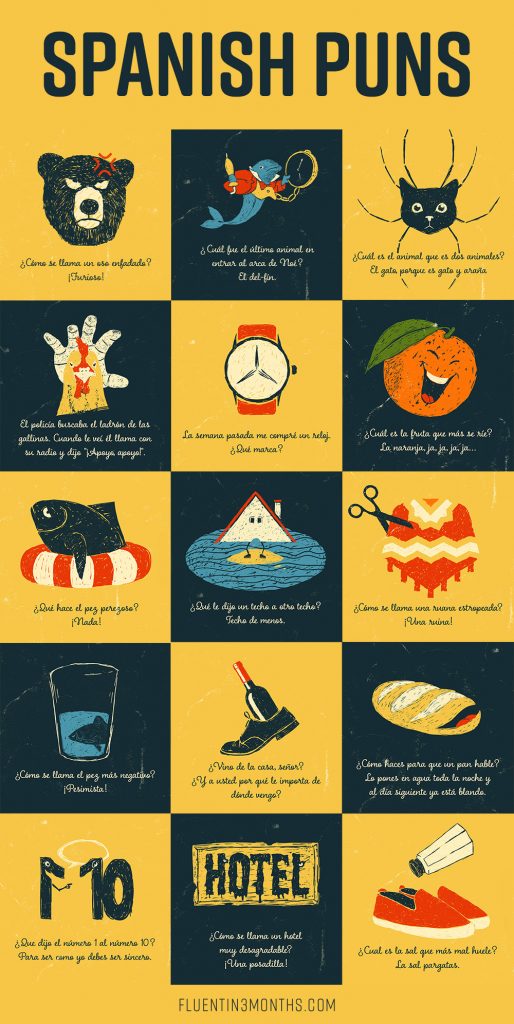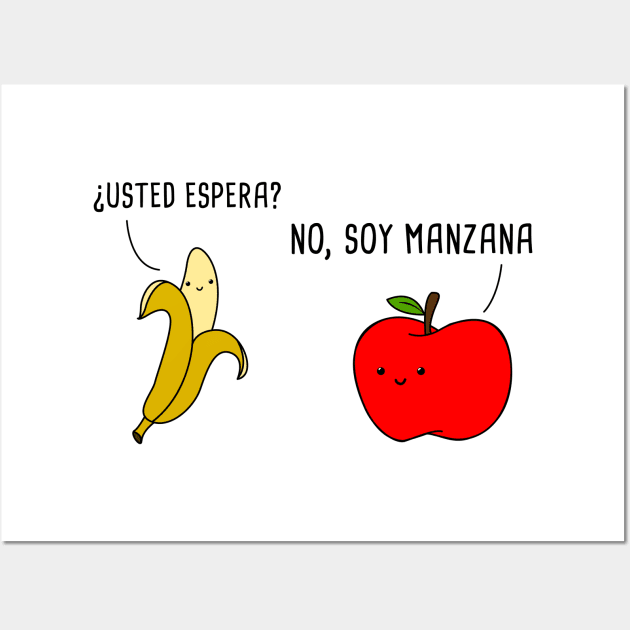Spanish puns are a fun way to play with words and tickle your funny bone. These clever wordplays in Spanish can bring laughter and joy to language learners.
Dive into the world of Spanish puns and discover the humor and creativity behind these linguistic gems. Have you ever chuckled at a witty Spanish pun that made you appreciate the beauty of language? From wordplay to cultural references, Spanish puns offer a delightful way to explore the nuances of the language.
Whether you’re a beginner or a fluent speaker, embracing the humor in Spanish puns can make your language learning journey even more enjoyable. Let’s unravel the charm and wit of Spanish puns together.

Credit: www.spanish.academy
Introduction To Spanish Puns
Spanish puns are a delightful form of wordplay that adds a touch of humor to the language. From clever double entendres to playful twists on words, Spanish puns showcase the wit and linguistic creativity of the Spanish-speaking world. In this blog post, we will explore the art of Spanish puns, diving into the laughter they evoke and the charm of their wordplay.
Laughter Across Languages
Spanish puns transcend linguistic barriers, bringing joy to speakers and learners of the language. Whether it’s a witty play on words or a clever twist that elicits a chuckle, these puns showcase the universal appeal of humor in the Spanish language. With a touch of creativity and a dash of linguistic flair, Spanish puns have the power to bring laughter and joy across cultures.
The Charm Of Wordplay
The charm of Spanish puns lies in their clever manipulation of language. They demonstrate the rich tapestry of words in Spanish, showcasing the depth of expression and the joy of linguistic acrobatics. Whether it’s a pun based on homophones, double meanings, or cultural references, the charm of Spanish puns lies in their ability to surprise and delight with their linguistic ingenuity.

Credit: www.fluentin3months.com
Puns In Spanish Culture
Spanish culture is rich in humor, with puns playing a significant role in various aspects of society. From everyday conversations to literature, puns add a touch of wit and playfulness to the Spanish language.
Role Of Humor In Spanish Society
In Spain, humor is deeply ingrained in society, serving as a way to connect people and lighten the mood in various situations. Humor acts as a social lubricant, facilitating interactions and fostering a sense of community among Spaniards.
History Of Puns In Spanish Literature
The use of puns in Spanish literature dates back centuries, with renowned writers incorporating wordplay in their works to entertain and engage readers. Puns are not only used for comedic effect but also to convey deeper meanings and nuances in storytelling.
Crafting Puns In Spanish
Spanish language is rich with wordplay and humor, and crafting puns in Spanish is an art form that reflects the linguistic nuances and double meanings inherent in the language. Let’s delve into the intricacies of crafting puns in Spanish and explore the common themes that make these linguistic gems so entertaining.
Language Nuances And Double Meanings
Spanish puns often rely on the language’s nuances and double meanings to create clever and witty wordplay. With its diverse vocabulary and subtle linguistic intricacies, Spanish offers ample opportunities for puns and plays on words. Homophones and homonyms are frequently employed to create humorous and thought-provoking puns that entertain and engage native speakers and learners alike.
Common Themes In Spanish Puns
Common themes in Spanish puns often revolve around everyday situations, cultural references, and the rich tapestry of the Spanish language itself. From food and family to regional dialects and historical events, Spanish puns draw inspiration from a wide array of subjects, adding depth and diversity to the world of wordplay. By tapping into these common themes, Spanish puns resonate with audiences on a personal and cultural level, making them all the more enjoyable.
Types Of Spanish Puns
When it comes to Spanish puns, there are various types that add a touch of humor and playfulness to the language. Let’s explore the different categories of Spanish puns, including homophones and homonyms, as well as cultural references and idioms.
Homophones And Homonyms
Homophones are words that sound the same but have different meanings, while homonyms are words that are spelled and pronounced the same but have different meanings. In the realm of Spanish puns, these linguistic phenomena are cleverly used to create wordplay that brings amusement and wit.
Cultural References And Idioms
Spanish culture is rich with unique references and idiomatic expressions, providing ample opportunities for creating puns. By playing with these cultural elements and idioms, Spanish speakers can craft clever and humorous wordplay that resonates with their audience, making language learning a delightful experience.
Bilingual Wordplay
When it comes to language humor, bilingual wordplay takes the cake. The ability to play with words in two different languages opens up a whole new world of puns, jokes, and witty expressions. Spanish-English puns, in particular, bring a unique flavor to language learning and cultural exchange. Let’s explore the world of multilingual humor and discover the charm of Spanish puns.
Spanish-english Puns For Language Learners
Learning a new language can be challenging, but incorporating puns and wordplay can make the process more enjoyable. Spanish-English puns offer a creative way for language learners to grasp the nuances of both languages while having a good laugh. Whether it’s a play on similar-sounding words or a clever translation twist, these puns add a touch of humor to the language learning journey.
Multilingual Humor
Multilingual humor transcends language barriers and brings people together through laughter. The fusion of Spanish and English in puns creates a delightful blend of cultural references and linguistic wit. It’s a testament to the richness of both languages and the creativity that arises when they intersect. Embracing multilingual humor opens the door to a world of linguistic playfulness and cross-cultural connections.

Credit: www.teepublic.com
Popular Spanish Puns
Are you ready to tickle your funny bone with some popular Spanish puns? From the classroom to social media, these witty wordplays have been spreading laughter and amusement. Let’s explore the world of Spanish puns and discover how they bring humor to different aspects of our lives.
Puns In Spanish Classrooms
When it comes to learning Spanish, puns add a touch of amusement to the classroom atmosphere. Teachers often use clever puns to engage students and make language learning more enjoyable. These puns not only foster a positive learning environment but also help students remember vocabulary and grammar rules in a fun and memorable way.
Social Media And Spanish Puns
Whether it’s Twitter, Instagram, or Facebook, social media platforms are buzzing with entertaining Spanish puns. Users share punny memes, jokes, and wordplays that resonate with Spanish-speaking communities worldwide. The viral nature of social media allows these puns to reach a wide audience, spreading laughter and joy across the digital landscape.
The Art Of Delivering A Spanish Pun
Spanish puns are not just about the words; they are about timing and tone, as well as understanding the audience reception.
Timing And Tone
When delivering a Spanish pun, the timing is crucial. The pun should be delivered at the right moment to maximize its comedic effect. Additionally, the tone of voice plays a significant role in how the pun is perceived by the audience.
Audience Reception
The audience reception of a Spanish pun can vary based on factors such as cultural background and language proficiency. It’s essential to gauge the audience’s reaction to ensure the pun lands successfully.
Learning Spanish Through Humor
Learning a new language can be a challenging task, but what if you could infuse some humor into the learning process? That’s where Spanish puns come into play. By incorporating puns into your language learning journey, you can not only have a good laugh but also enhance your understanding of the Spanish language. Let’s explore the educational benefits of puns and how they can serve as a memory aid when learning Spanish.
Educational Benefits Of Puns
When it comes to learning a new language, engagement is key. Spanish puns provide an entertaining way to grasp linguistic nuances and cultural references. By deciphering puns, learners can gain a deeper insight into the Spanish language’s playfulness and intricacies. This makes the learning process more enjoyable and memorable.
Puns As A Memory Aid
Integrating puns into language learning can act as a memory aid. The humor and wordplay associated with puns create memorable associations, helping learners retain vocabulary, grammar rules, and idiomatic expressions. As a result, learners are more likely to recall and apply these linguistic elements in real-life conversations, thus reinforcing their language skills.
Conclusion: Embracing The Siesta Of Laughs
Indulge in a whimsical journey through the world of Spanish puns with “Conclusion: Embracing the Siesta of Laughs. ” Delight in the linguistic playfulness and clever wordplay that will surely tickle your funny bone.
The Joy Of Spanish Puns
Puns are a clever play on words that can bring laughter to any conversation. And when it comes to the Spanish language, there are plenty of puns to go around. From wordplay to cultural references, Spanish puns offer a unique way to incorporate humor into language learning. Some of the most popular Spanish puns involve double meanings of words, homophones, or homonyms. For example, “¿Por qué los patos hacen ruido cuando vuelan? Porque no pueden llevar silenciadores en sus quacks!” is a play on the word “quack” which sounds like the Spanish word “cuac” meaning “quack” as well as the English word “quack” meaning a fake doctor. Another popular Spanish pun is “¿Cómo llama una abeja a otra abeja? Buzz-tante!” which is a play on the word “bastante” meaning “enough” and the sound that a bee makes.Incorporating Humor Into Language Learning
Learning a new language can be challenging, but incorporating humor can make it more enjoyable and effective. By using puns and jokes, language learners can improve their vocabulary, pronunciation, and comprehension skills while having fun. One way to incorporate humor into language learning is by watching Spanish comedies or reading humorous books in Spanish. This exposes language learners to different aspects of the language, including idioms, slang, and cultural references. Another way to incorporate humor is by practicing with a language partner or tutor who can help create and explain Spanish puns. Language learners can also try creating their puns and jokes, which can be a fun and rewarding experience. In conclusion, embracing Spanish puns can add a siesta of laughs to language learning. With their clever wordplay and cultural references, Spanish puns offer a unique way to improve language skills while having fun. So why not give it a try and see how many puns you can come up with?Frequently Asked Questions
What Is The Meaning Of Posadilla?
A “posadilla” is not a real word but a mix of “posada” (hotel) and “pesadilla” (nightmare), creating a nightmarish inn.
What Are Spanish Words?
Spanish words are words in the Spanish language, such as “Hola” (Hello) and “Adios” (Goodbye).
What Is The Meaning Of The Spanish Word “posadilla”?
A “posadilla” cannot be directly translated because it’s not a real word. It’s a combination of “posada,” meaning a hotel or inn, and “pesadilla,” which means “nightmare. ” So a nightmarish posada is a posadilla.
What Are Some Basic Spanish Words?
Some basic Spanish words include “Hola” (Hello), “Adios” (Goodbye), “Gracias” (Thank you), “Por favor” (Please), “Si” (Yes), “Claro” (Of course), “No” (No), and “Amor” (Love).
Conclusion
In a nutshell, Spanish puns add humor and creativity to language learning. They make learning fun and engaging, helping learners remember vocabulary in a unique way. Embracing Spanish puns can enhance language retention and spark joy in the learning process.
So, keep laughing and learning with Spanish puns!


Comments